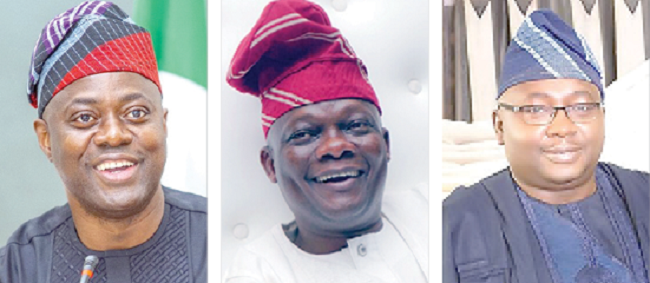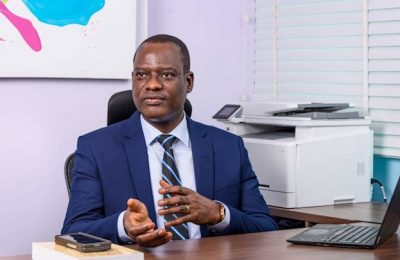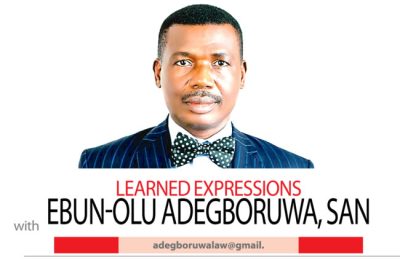In this piece, WALE AKINSELURE x-rays how Governor Seyi Makinde of Oyo State was able to win a second term, with a landslide, in spite of the odds that were not in his favour.
A climax came to weeks of frenzy, campaigns, political gymnastics, propaganda, name calling, name smearing, religion tilting, media push, permutations, strategic moves, manipulations, money gifting to curry support when, on Sunday, the returning officer for the Oyo State governorship election, Professor Adebayo Bamire announced candidate of the Peoples Democratic Party (PDP) and incumbent governor, Mr Seyi Makinde as winner of the March 18 governorship election for the state.
After a local government by local government collation of the election results, the returning officer, at the Mutiu Agboke Collation Centre, of the Oyo State headquarters of the Independent National Electoral Commission (INEC), Ibadan, announced the final results thus: Makinde Oluseyi of the Peoples Democratic Party (PDP), 563,756; Folarin Teslim, All Progressives Congress (APC), 256,685; Adelabu Adebayo, Accord, 38,357. His victory was commanding as he had 64.45 percent of the 874,672 valid votes cast on the election day.

Makinde’s victory was also epochal being only the second governor in the history of the state to win a second term. It was equally historic in terms of the margin of victory as he had 307,071 votes more than Folarin who came second in the race.
Moreover, in the 2019 election, Makinde had 157,639 votes more than his main challenger, Bayo Adelabu of the APC. The 2015 election saw Abiola Ajimobi win with 72,790 votes over Rashidi Ladoja.
But, how many people really predicted that Makinde would record such a landslide victory?
As the election day approached, observers identified the top three in the race as candidates of the PDP (Makinde), APC (Folarin) and Accord (Adelabu). Quite a number of the predictions were that it was too close to call. Makinde, the incumbent was relying on his popularity among the people, having delivered dividends of democracy to them in three and a half years; Folarin was hoping to lash on the massive victory of the APC in the state in the presidential and National Assembly elections; Adelabu was coming in as being with a party that offered an alternative to the dominant APC and PDP in the state.

For Makinde, the incumbent, it looked as if the odds against his reelection outnumbered those in his favour. Notions that the internal crises in the Oyo PDP were overwhelming with Makinde in dilemma about how to resolve them before the election grew when there was no statement about how the campaign would proceed as of the October 12, 2022 official date for commencement of governorship election campaign. Even the party leadership in the state was also in dilemma as it looked up to the party leader, Makinde, for direction. From the 2019 coalition members pulling away from the governor to some party leaders lamenting being sidelined in affairs of the party to grievances of party members about the fallout of the party congresses, the crisis in the party looked intractable. This was coupled with views that the governor seemed to have neglected Ibarapa zone, especially, while focusing a lot of attention on the Oke-Ogun zone of the state.
The agitation of G5 governors, which Makinde was a party of, further put party members, especially candidates, in dilemma about how to go about their campaigns. With the body language of the party leader, Makinde, not favouring campaigning for the PDP presidential candidate, Alhaji Atiku Abubakar, several of the candidates, especially those vying for Senate and House of Assembly candidates, could not openly do a “top to bottom” campaign, so as not to be seen as offending the wish of their party leader in the state.
Apparently in recognition of the need to resolve some of its internal crisis before open-air campaigns, the party, through the state secretary, Wasiu Adeleke announced that campaigns for elections in the state would commence with consultative and town hall meetings in each of the seven geo-political zones of the state. The zonal meetings kicked off on November 22, 2022, in Oyo town, and ran till December 17. Each zonal meeting was an opportunity for Makinde to meet stakeholders in each zone, hear out their misgivings; plead with aggrieved members, reconcile aggrieved members in each zone asking them to unite for the party’s victory, tell constituents what he had done for their zone in the past three years; promise them more under Omituntun 2.0, while seeking support for himself, party candidates for Senate, House of Representatives and state House of Assembly. Though Makinde met with some aggrieved members across zones, no reconciliation was reached with some known aggrieved party members and those who left what they described as a failed coalition, among which were Honourable Mulikat Akande-Adeola, Alhaji Bisi Olopoeniyan, Mr Femi Babalola and Dr Olufemi Lanlehin.
As regards whom to vote during the presidential level, Makinde, at the various consultative meetings, was always quick to respond with his prepared narration that the PDP G5 agitation, which he proudly was a part of, was in the interest of unity, fairness, equity and justice. Makinde was always quick to narrate the imperative of having power shared between the North and South especially, chiding the failure of the PDP to ensure equity by having its presidential candidate and national chairman, Dr Iyorchia Ayu, both from the North. Notwithstanding the governor’s repeated explanations, there remained loud hushed tones about the governor’s unclear stance regarding his preferred presidential candidate.
Though campaigns continued, there remained fears among party members and National Assembly candidates, especially, that the governor’s seeming opaque stance regarding his presidential candidate may backfire. Those party members who were all-out in support of Atiku among who were Mrs Jumoke Akinjide, Mr Hazeem Gbolarumi, Mr Femi Babalola, Mrs Bolanle Aliyu-Sarumi and Senator Hosea Agboola were disappointed that Makinde never clearly campaigned for Atiku. And it did backfire with the PDP failing to win any of the three senatorial seats while also winning, only four of the 12 House of Representatives’ seats thus far.
The poor performance of the PDP in the February 25 election in the state spurred campaign like never before. Though the governor had followed up the consultative meetings with open-air campaigns across the 33 local government areas of the state before the February 25 elections, the volume of campaign activities that followed the presidential and National Assembly election was tuned up to the highest decibel. After meeting with the candidates of the party, who lost the National Assembly elections at Government house, Ibadan, to beg for their support for the governorship election and assure them of ameliorating their losses, it was all-out campaign for Governor. Makinde, his appointees, canvassers, support groups, party members, candidates, his supporters took to both mainstream and digital media platforms to market their candidate while also knocking the positions of his Makinde’s co-contestants. They particularly noted that he had delivered on his promises as made on his inauguration day as governor and as contained in the Oyo State Roadmap for Accelerated Development, 2019-2023. Makinde and his canvassers are quick to point to his strides in building infrastructure that targets the state economy and connecting the zones of the state, the ripple effect of regular payment of salary and pensions on the economy and livelihood of the citizens, his ensuring the sole ownership of Ladoke Akintola University of Technology (LAUTECH), Ogbomoso, the upgrade of the Emmanuel Alayande College of Education to University of Education; renovation of school infrastructure, renovation of Primary Health Centres (PHCs) across the state, investment in security especially purchase of vehicles and security equipment for security agencies and recruitment of over 1,500 personnel into Amotekun, not implementing total lockdown during COVID-19, among others.
Leading the way was Makinde himself who did the leg walk meeting with tons of personalities, groups, associations seeking their support or those declaring support for his bid, especially where he perceived he was losing their support ahead of the election. As many collapsed their structure, Makinde or associates were there to welcome them. Logistics was also pumped out like never before for mobilization of possibly every resident of the state. Moreover, the more the merrier.
The election held one week after the initial March 11 date set by the INEC. That one week extension may have extended the margin of victory for Makinde as he maximised the ‘interlude’ to troubleshoot, made amends, straighten the rough edges. Makinde efficiently used the media to constantly put himself in the mind of residents of the state. He made several media appearances between February 25 and March 18 to the extent that he featured on three radio stations in one day. With the campaign, in its final days, taking a religious tilt, the Makinde team also got elder statesmen, religious leaders, top politicians to speak in the governor’s favour. Among those who featured on radio stations to endorse and rally support for Makinde were Dr Omololu Olunloyo, Alhaji Yekini Adeojo, former governor Ayodele Fayose of Ekiti State, Alhaji Kamil Oloso, Alhaji Taofeek Akewugbagold. There also came opposition parties and candidates declaring support for Makinde among who were the governorship candidate of the Social Democratic Party in the state, Mr Micheal Lana; state working committees of the Labour Party and Accord and the conference of deregistered political parties.
Going into the election without reconciling with perceived top politicians in the state, Makinde seemed to have drawn the battle line with them while saying he relied on the people of the state to whom he avowed he had delivered the dividend of democracy to. He avowed that he had the people of the state to vote for him, relied on God, the Father and not godfathers. In the opinion of some pundits, Makinde proved a point in the history of the state and soundly won with the people on his side, not minding major political figures. With his co-contestants, Folarin, Adelabu and former Governor Ladoja congratulating the governor on his victory, Makinde has his work cut out. According to observers, residents of the state will hope that Makinde will also deliver on the sustainable development (Omituntun 2.0) that he has promised and would not join the league of governors that usually do little or nothing during their second term in office. Though Makinde has shown he has a grasp of the people and politics of the state, it waits to be seen whether he will sustain his present foothold on the state ahead of the 2027 elections. 2027 politicking may begin from May 29 when Makinde begins his second term, with politicians, who lost out this time, expected to align and realign to better their political fortunes.







